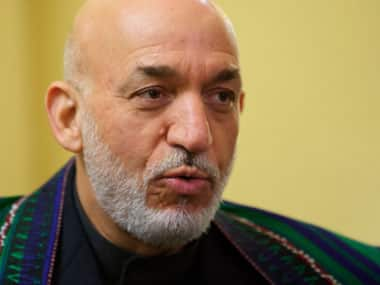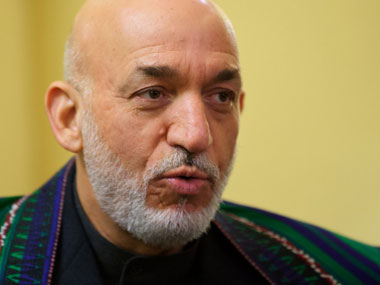By Sujeet Sarkar The ongoing presidential election in the conflict-ridden Afghanistan is being watched by all players and stakeholders with bated breath. By all indications, it is set for a nail-biting finish. After the fall of the Taliban, this fragile nation has taken significant strides in expanding the scope and flow of the democratic process. With its third election in a row, it has further deepened its democratic root. However, the result of the poll so far, has surprised all and sundry. With none of the candidates being able to strike the majority mark, a run-off election or a second round between the two leading presidential candidates, Abdullah Abdullah and Ashraf Ghani, is scheduled for 14 June 2014.[caption id=“attachment_1537833” align=“alignleft” width=“380”]  Afghanistan President Hamid Karzai. AFP[/caption] Afghan constitution allows a patch-up deal between the two leading candidates clearing way for a coalition government in case one of the two front-runner candidates withdraws his candidature, in order to avoid the second round. However, with neither of the two leading candidates blinking so far or showing any sign of compromise, the run-off election between the two seems inevitable. This makes the ongoing presidential race all the more thrilling. Afghanistan would witness a run-off election, for the first time in its history. To predict a winner in the second round based on the arithmetic of the first phase of the presidential election would be professional hara-kiri for any psephologist. A large number of additional factors would play in and influence voting pattern in the final round of election. More than the credential of the two frontline candidates, the support of the candidates routed in the first round of election would decide the winner in the final round. The alignment of votes would massively shift with the crossover of the unsuccessful candidates into either of the two camps. Two such candidates in the fray—Abdul Sayyaf and Zalmai Rassoul—would make the run-off round all the more interesting, as both of them have garnered considerable proportion of votes in the initial phase. The voting percentage of Zalmai Rassoul has, however, not met street expectation considering the fact that he enjoyed the tacit backing of the incumbent president, Hamid Karzai. In all likelihood, he would end up backing Ashraf Ghani for few ministerial berths for himself and his key deputies. Both Zalmai Rassoul and Ashraf Ghani are seen as moderate leaders with progressive views. In some sense, they are a clone of Hamid Karzai, in terms of their policies and political vision. And it would not be a surprise if such an alliance happens around the expected lines of thinking. However, it would be interesting to see which way Abdul Sayyaf, another regional satrap with significant hold in the Parwan and nearby provinces, sways. Known more for his radical stance, he has suddenly emerged as a kingmaker in Afghanistan. He will certainly encash his new-found status to gain most from the unfolding situation. Both Abdullah Abdullah and Ashraf Ghani may find it difficult to accommodate him. They are, however, left with little choice when it comes to leaving him, in the upcoming tight fray. Both the contesting candidates would make an all-out attempt to lure him with lucrative offering and political rehabilitation in the post Karzai government. Ashraf Ghani may be lagging far behind from the front-runner Abdullah Abdullah, in the first round. But with a change of political alignment and a high probability of the Zalmai camp crossing over, he would give it a tough fight in the run-off round, for sure. He even stands a fair chance of emerging with flying colours, if he can get the alliance arithmetic right. But that would largely depend upon the failure of the Abdullah Abdullah camp to stitch strategic and meaningful alliance with the routed candidates from the first phase of election. Abdullah Abdullah knows that this election present him the best ever chance of riding his long-pending dream to rule the country. And he would leave no stones unturned in the process. He may even come out with some out-of-the box thinking and offer extra-constitutional post to both Zalmai Rassoul and Abdul Sayyaf, in order to lure the duo into his camp and seal his win. Ashraf Ghani is not likely to idle either while the rival camp weaves an alliance. In this decisive phase of election, the shrewd political strategists of both the camps are working overnight on various permutations and combinations to get the alliance arithmetic right. While the two leading candidates hunt for a strategic poll alliance, the routed candidates may notch up a grand alliance under Sayyaf to get the bargaining power at their end. This would help them run away with a significant pie of the new government. In this scenario they would end up making the most from the troubled waters. There is a famous saying that in Afghan politics that you gain more by losing election. The present election may head in the said direction. Meanwhile, more than the citizens of Afghanistan, the US is watching the outcome of this election anxiously. The election entering into the run-off phase has left them frustrated to the hilt. They are frantically waiting for the new government to ink the security pact, which would allow the US to keep a slender battalion of military forces in certain base camps of Afghanistan. With Karzai government showing no sign of relenting, President Obama is left with no option but to pin his hopes on the new president. With the run-off election delaying the whole process of sealing the deal, the US military leaders and think tanks are more worried than ever. Even though the two front-runner presidential candidates have expressed no dissension against the US security deal, they may impose strict conditions for their local image building, thus severely risking the security pact. With their once-blue-eyed boy Karzai ditching them at the last stage, the US cannot take things for granted anymore in Afghanistan. There are other countries, too, which has put high stakes in the Afghan election and they are excitedly watching the outcome of the run-off election. The Pakistan camp must be worried with the prospect of Abdullah Abdullah emerging as the front-runner. Abdullah represents Northern Alliance and the legacy of the late lion of Panjsher, Ahmad Shah Massoud who resisted and waged a lone battle against the Taliban till his last breath. Taliban sees Northern Alliance as their enemy number one and vice versa. Due to the proximity of ISI with Taliban, the Northern Alliance has always maintained an uneasy relationship with Pakistan. This has put Pakistan Army and by extension Pakistan, in a tight spot. Should Abdullah Abdullah occupy the throne in Kabul, the dream of the Pakistan Army to muscle in the peace process in Afghanistan would also fade away, like never before. There are already reports of a worried and uneasy feeling in the Pakistan military, about the latest development in Kabul. Unlike the incumbent president, Abdullah Abdullah is not going to give a long rope to ISI to meddle with the peace process in Afghanistan. If Ashraf Ghani wins the election, given the shrewd economist he is, the current phase of development would continue, with an increased focus on economic consolidation. The Taliban would continue to keep the Afghan government bleeding by inflicting damage every now and then. And the status quo would continue in Afghanistan for an extended period of time. In all likelihood, the peace process may gain momentum. Albeit remote, it is possible that some of the moderate Taliban leaders may give up their arms and abide by the constitutions under the fold of the peace process. However, if Abdullah Abdullah emerges victorious, Afghanistan would enter into a decisive phase. Even though their policies would resonate with the ongoing peace process, they would deal with the Taliban with an iron hand, as and when they cross the red line. The country has already witnessed a trailer with the appointment of Amruddin Saleh, a hardcore Northern Alliance member, as a National Security Advisor. He inflicted quite a damage in the rank and file of the Taliban during his relatively shorter stint at Kabul. The Taliban will preferably not wait for the Northern Alliance to make the first move. They would respond with an equal alacrity. There is no love lost between them and there are looming fears that the elevation of Abdullah Abdullah may derail the ongoing peace process as the Taliban may not be excited with the prospect of pursuing it anymore. Northern Alliance would further be seriously uncomfortable with the idea of sharing power with the Taliban in order to politically accommodate them under any peace deal. Pakistan would manage the new political development, by accelerating their time-tested and dividend-yielding approach of deceit and duplicity. ISI would clamor for peace process with the Taliban leaders at their disposal, and the ISI within the ISI would influence Taliban operation in Afghanistan. But they would feel completely isolated in the new political set up, should Abdullah Abdullah take up the reign of power. India would be happy to welcome either of them as they have managed their equation with Northern Alliance very well right from Ahmad Shah Masood days. They have further invested their stakes very strategically in this election. India being the second largest civilian donor in Afghanistan, the new leadership of both the countries would drive the Indo-Afghan bonhomie to the next level much to the chagrin of Pakistan. Afghan policy would continue to occupy prime focus for the new political set up in south block. A stable Afghanistan is in overall interest of India. With NATO set to leave Afghanistan post September 14, and an ever-strong Taleban on the brink of launching their spring offence, the task for the new president seems to have been cut out from day one. The new president has to further deliver on the economic front as well since international aid money has started dwindling in Afghanistan. It is certainly going to be a tight-rope walk. The outcome of this election is bound to drive the embattled nation into a decisive phase. One can only hope that it delivers the best result in the interest of Afghanistan and its people. Sujeet Sarkar works as an international adviser on governance and civil society. He has authored a book on Afghanistan titled In search of a new Afghanistan.
If Ashraf Ghani wins the election, given the shrewd economist he is, the current phase of development would continue, with an increased focus on economic consolidation.
Advertisement
End of Article
Written by FP Archives
see more


)

)
)
)
)
)
)
)
)



